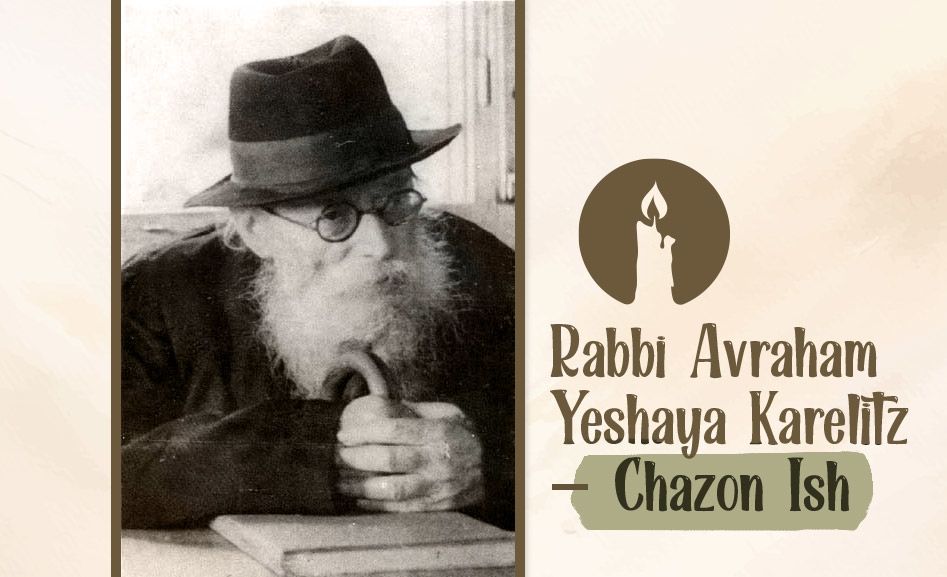
Rabbi Menachem Mendel – The Kotzker Rebbe
Date of Passing: 22-Shevat. Reb Mendel was a new type of chassid. If the Baal Shem Tov embodied chessed (kindness), Reb Mendel represented din (justice)...

Born: Goray, near Lublin, Poland,, 1787
Died: 27 January 1859 (22 Shvat 5619), Kotzk, Poland, 1859
Menachem Mendel received a thorough Torah education from his father, Leibush Morgenstern, a zealous opponent of Chasidism. When he was 13 years old he had mastered the entire Talmud. After his marriage at 14, his father introduced him to the world of Chasidut, and before long he became an ardent follower of the Chozeh (Seer) of Lublin and Rabbi Simcha Bunam of Pshis’cha, whom he eventually succeeded.
When he became the Rebbe of Kotzk, thousands of chasidim flocked to that city and a great number of outstanding young Torah scholars were attracted by his saintly personality and wide range knowledge. Most prominent among his students were the Chidushei Harym of Ger and Rabbi Chanoch of Alexander.

R’ Menachem Mendel was a new type of chassid. If the Baal Shem Tov embodied chesed (kindness), Reb Mendel represented din (justice). While the Baal Shem sought to reach all the people, Reb Mendel knew that what he sought could only be attained by the elite. The Baal Shem lifted the people up, Reb Mendel rebuked them for their inadequacies and always demanded more.
Reb Mendel attracted a young, brilliant, aspiring youth. He demanded withering self-analysis and disdained mitzvot performed with a whiff of self-interest. He recognized the centrality of the ego, but refused to accept it. An uncompromising champion of the truth, he denounced falsehood and hypocrisy. With piercing aphorisms that have became classics he forces the Jew to face the truth, strip himself of all pretense and self-deception, and thus come closer to God. He cried out, “Give me ten chasidim who will follow me to the desert, eat manna and forsake the decadent world”.
Continuing on the path of Rabbi Simcha Bunam he sought to infuse the movement with renewed spiritual vigor, making Kotzk a stronghold of Chassidut whose influence is felt to this day. A man of deep mystery, the Kotzker Rebbe secluded himself for 20 years, refusing contact with anyone. His thoughts and commentaries were collected and published in Ohel Torah and Emet Ve’emunah. He was an awe-inspiring figure who left an indelible mark on chassidic thought.
The Kotzker Rebbe’s wisdom was also recorded in the book Amod HaEmet (Hebrew).
May the merit of the tzaddik Rabbi Menachem Mendel of Kotzk protect us all, Amen.
***
Here are some sayings that have been attributed to the Kotzker Rebbe:
- What kind of G-d would He be if I could understand Him?
- If I am I because I am I, and you are you because you are you—then I am I and you are you. But if I am I because you are you, and you are you because I am I—then I am not I and you are not you.
- Do not be satisfied with the speech of your lips and the thought in your heart, all the promises and good sayings in your mouth, and all the good thoughts in your heart; rather you must arise and do!
- A person must renew himself, and his world with him, each and every day. But one who does not do so, and rather performs his deeds as a mechanical function, does nothing other than the actions of a monkey. Just as this monkey has no personality of his own, but rather copies his own actions and his fellow, so too this person.
- Not all that is thought need be said, not all that is said need be written, not all that is written need be published, and not all that is published need be read.
- People are accustomed to look at the heavens and to wonder what happens there. It would be better if they would look within themselves, to see what happens there.
- Where is Hashem to be found? In every place where He is given entry.
- You don’t love fish. If you loved the fish, you would not have killed it and cooked it on a fire.
- Just as it is the way of an ape to imitate humans, so too, a person, when he has become old, imitates himself, and does what was his manner previously. [In other words, most of us, at some point in life, either consciously or not, become satisfied with who we are and what we’ve become. As such, we cease to strive toward attaining greater spiritual heights. We are content to live out our remaining days as a mere imitation of ourselves!]
- Each person was created in his/her image and only then in God’s image.
- The way of the world is such that parents feel the pain of their children, but the children are oblivious to the suffering of their parents. Likewise, G‑d feels our pain, but we are blind to His misery.
- If you need to hide something—something is wrong.
- The body finds it easier to accept all kinds of suffering than to accept the yoke of Heaven.
- Elijah the Prophet will not enter through the door or even the window. He will come by way of your heart and your mind.
- A great generation can make do with petty leaders. But a lowly generation needs great leaders.
- Not every thought should be said. Not every speech should be written down. And not all writings are fit for print.
- Don’t fool yourself and don’t imitate your fellow.
- A person has two eyes—one to see the greatness of G‑d and the other to see his own smallness.
-
Blaze your own path. You can be sure that it has not been sullied by others.
-
More important than writing is erasing.
Source: Chabad.org











Tell us what you think!
Thank you for your comment!
It will be published after approval by the Editor.